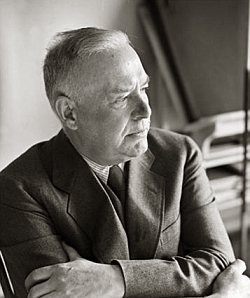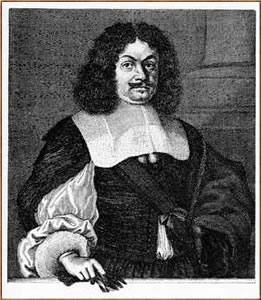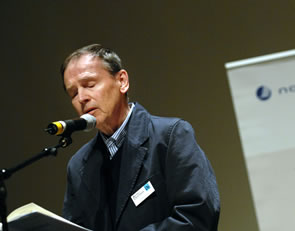De Vlaamse dichter en schrijver Dimitri Verhulst werd op 2 oktober 1972 geboren in Aalst. Zie ook mijn blog van 16 oktober 2006 en ook mijn blog van 16 oktober 2007 en ook mijn blog van 2 oktober 2008.
Uit: Godverdomse dagen op een godverdomse bol
„Alle begin is moeilijk. Kijk maar. ’t Kruipt uit het water zonder om te zien. ’t Zou nog een laatste blik kunnen werpen op de oceanen, heimwee voelen uit eerbied, maar dat doet ’t niet. ’t Heeft er namelijk genoeg van te moeten kruipen over de zandbodems der wateren, genoeg van de eikelwormen en de pijlwormen en de chordadieren en de manteldieren en de koplozen waarmee ’t zoveel eeuwen de zeeën heeft gedeeld. ’t Zegt saluut tegen de kwastvinnigen, de mosselen en de schollen, vaarwel tegen de knorhanen, de alen en de brasems, ’t wil van geen samenleven meer weten met de zalmen en de karpers. ’t Doet de groeten aan de rietvoorn en ’t wenst ook de baarzen nog het beste, maar ’t kan niet meer weerstaan aan de veelbelovendheid van z’n bestaan en verlaat het sop. Wel toe, ’t schijt nog een laatste keer hevig in de zee, zijn symbolisch geladen manier om een beslissing te onderstrepen, legt zich te druipen en te drogen waar de parelgierst vlot kiemt en trekt dan de rimboe in om er zich te vormen tot een bekijkelijk monster met dikke knokkels, talgklieren, een hele eind darmen en een speklaag. En haar, wreed veel haar van onder tot boven waarin de vlooien en de teken simpel overleven door hun gastheer jeuk te bezorgen, zodat die moet krabben tot zijn vel aan vodden hangt en zij kunnen zuipen van zijn bloed.
Hoe laat is het?
(…)
’t Heeft zich, als zovelen die het water ontwijdden en verlieten, verdeeld in houders van kloten en dragers van spleten. Maar ’t is, met uitzondering van een voor de rest niet ter zake doende bonobo, het enige schepsel en zal ook het enige schepsel blijven waarbij de reu de teef langs de voorkant neemt en volpompt met een nageslacht; zo kan de reu de haat en de angst zien op het ruwe smoelwerk van de teef, de aversie, de walging.
’t Paart in de stank van elkanders tanden, de ene met de andere en de ander na de één. Want veel is er niet te doen. Bessen vreten en wroeten in de aarde op zoek naar zeggewortels om op te sabbelen. ’t Likt plassen droog, kraakt noten, en laat af en toe zijn muil vol mieren lopen: heerlijke termieten die ’t op een tak wist te verzamelen, sappig en rijk aan vitamines. Dat doet ’t.
Dat en jodelen naar de maan, uit zottigheid. O, hoe heerlijk uit het water te zijn gekropen, waar men onachtzaam kuit schoot, slijmen in het rond spoot of wat cellen deelde om de leegten dezer wereld op te vullen.
En hoe heerlijk om dit alles te overpeinzen voor ’t slaap vat in de bomen, in vrede met zichzelf en het gevogelte.
Maar het wordt warm. Te warm. De vruchten verdrogen en de bomen worden arm. Onder het zenit zet de hitte zich vast op zijn pels. Z’n rug lijkt te wel verschoeien.
En om zich klein te maken voor de zon richt ’t zich op. De snoodaard. Ziezo. Er zijn nu alleen nog z’n kop en zijn schouders die ’t offert aan de zon, maar de rest van zijn lijf hoeft niet meer te blakeren. Kijk, zonder handen! ’t Stapt op zijn achterpoten!“

Dimitri Verhulst (Aalst, 2 oktober 1972)
De Engelse schrijver Graham Greene werd geboren op 2 oktober 1904 in Berkhamsted, Hertfordshire. Zie ook mijn blog van 2 oktober 2006 en ook mijn blog van 2 oktober 2007 ook mijn blog van 2 oktober 2008.
Uit: Jagd im Nebel (The confidential agent, vertaald door Christian Spiel)
“Die Möwen jagten über Dover hin. Wie Nebelflocken segelten sie aufs Meer hinaus und kurvten zurück in Richtung auf die verborgene Stadt, während die Sirene in ihre Klagen einstimmte. Andere Schiffe antworteten, ein ganzer Chor hob einen Trauergesang an — auf wessen Tod?
Mit halber Kraft bewegte sich das Schiff durch den bitterkalten Herbstabend. Es erinnerte D. an einen Leichenwagen, der langsam und diskret dem Hain des ewigen Friedens entgegenrollt, wobei der Kutscher sorgfältig darauf achtet, daß der Sarg nicht durchgerüttelt wird, als würde die Leiche ein paar Püffe übel vermerken. Durch die Nebelschwaden gellte das Geschrei hysterischer Frauen.
Die Bar in der Dritten Klasse war gerammelt voll. Lärmend drängelten sich die Mitglieder einer Rugby-Mannschaft, die auf der Heimreise war, nach ihren Gläsern. D. verstand nicht alles, was sie brüllten; vielleicht war es Jargon oder irgendein Dialekt. Es würde eine Weile dauern, bis sich seine Erinnerung an das Englische wieder ganz einstellte; er hatte es früher sehr gut beherrscht, jetzt aber waren seine Reminiszenzen an die Sprache mehr literarischer Natur. Er versuchte sich abseits des Gedränges zu halten, ein Mann mittleren Alters, mit dichtem Schnurrbart, einer Narbe am Kinn und einer Stirn, an der die Sorge wie eine Gewohnheit in Falten nistete; doch in dieser Bar konnte man sich kaum bewegen — ein Ellenbogen wurde ihm zwischen die Rippen gerammt, und ein Mund hauchte ihm Dosenbier-Dunst ins Gesicht. Die Leute hier versetzten ihn in Erstaunen; ihre rauchgeschwängerte Kumpelhaftigkeit hätte einen nie auf den Gedanken gebracht, daß ein Krieg im Gange war — nicht nur in dem Land, aus dem er gekommen war, sondern auch hier, nur knapp einen Kilometer vom Wellenbrecher des Hafens von Dover entfernt. Er trug den Krieg mit sich. Überall, wo D. hinkam, war auch der Krieg. Er konnte es einfach nicht fassen, daß die Menschen das nicht merkten.
»Paß zu mir, Paß zu mir!« schrie einer der Sportler dem Barkeeper zu, aber ein anderer schnappte ihm das Glas Bier weg und brüllte: »Abseits !« — »Ins Gedränge!« schrien alle zusammen. »Erlauben Sie, erlauben Sie«, sagte D. und zwängte sich langsam ins Freie. Er schlug den Kragen seines Regenmantels hoch und stieg hinauf auf das kalte, neblige Deck, wo die Möwen klagend über seinen Kopf hinweg Dover entgegen segelten. Mit gesenktem Kopf begann er an der Reling auf und ab zu wandern, um sich warmzuhalten.
Das Deck war wie eine Landkarte, übersät mit Schützengräben, unhaltbaren Positionen, Frontausbuchtungen, Gefallenen; zwischen seinen Augen hoben Bomber vom Boden ab, und in seinem Gehirn erbebten die Berge unter Granateinschlägen.”

Graham Greene (2 oktober 1904 – 3 april 1991)
De Amerikaanse dichter en essayist Wallace Stevens werd geboren op 2 oktober 1879 in Reading, Pennsylvania. Zie ook mijn blog van 2 oktober 2008.
Continual Conversation With A Silent Man
The old brown hen and the old blue sky,
Between the two we live and die–
The broken cartwheel on the hill.
As if, in the presence of the sea,
We dried our nets and mended sail
And talked of never-ending things,
Of the never-ending storm of will,
One will and many wills, and the wind,
Of many meanings in the leaves,
Brought down to one below the eaves,
Link, of that tempest, to the farm,
The chain of the turquoise hen and sky
And the wheel that broke as the cart went by.
It is not a voice that is under the eaves.
It is not speech, the sound we hear
In this conversation, but the sound
Of things and their motion: the other man,
A turquoise monster moving round.
Domination Of Black
At night, by the fire,
The colors of the bushes
And of the fallen leaves,
Repeating themselves,
Turned in the room,
Like the leaves themselves
Turning in the wind.
Yes: but the color of the heavy hemlocks
Came striding.
And I remembered the cry of the peacocks.
The colors of their tails
Were like the leaves themselves
Turning in the wind,
In the twilight wind.
They swept over the room,
Just as they flew from the boughs of the hemlocks
Down to the ground.
I heard them cry — the peacocks.
Was it a cry against the twilight
Or against the leaves themselves
Turning in the wind,
Turning as the flames
Turned in the fire,
Turning as the tails of the peacocks
Turned in the loud fire,
Loud as the hemlocks
Full of the cry of the peacocks?
Or was it a cry against the hemlocks?
Out of the window,
I saw how the planets gathered
Like the leaves themselves
Turning in the wind.
I saw how the night came,
Came striding like the color of the heavy hemlocks
I felt afraid.
And I remembered the cry of the peacocks.

Wallace Stevens (2 oktober – 1879 – 2 augustus 1955)
De Duitse dichter en schrijver Andreas Gryphius (gelatiniseerde naam van Andreas Greif) werd geboren op
2 oktober 1616 in Glogau (Silezië). Zie ook mijn blog van 2 oktober 2006 en ook mijn blog van 2 oktober 2007 en ook mijn blog van 2 oktober 2008.
An die Sternen
Ihr Lichter / die ich nicht auff Erden satt kann schauen /
Ihr Fackeln / die ihr Nacht und schwartze Wolcken trennt
Als Diamante spilt / und ohn Auffhören brennt;
Ihr Blumen / die ihr schmückt des grossen Himmels Auen:
Ihr Wächter / die als Gott die Welt auff-wolte-bauen;
Sein Wort die Weißheit selbst mit rechten Namen nennt
Die Gott allein recht misst / die Gott allein recht kennt.
(Wir blinden Sterblichen! was wollen wir uns trauen!)
Ihr Bürgen meiner Lust / wie manche schöne Nacht
Hab ich / in dem ich euch betrachtete / gewacht?
Herolden diser Zeit / wenn wird es doch geschehen
Daß ich / der euer nicht allhir vergessen kan /
Euch / derer Libe mir steckt Hertz und Geister an
Von andern Sorgen frey werd unter mir besehen?

Andreas Gryphius (2 oktober 1616 – 16 juli 1664)
Kopergravure van Philipp Kilian
De Zweedse dichter en vertaler Göran Sonnevi werd geboren in Lund op 2 oktober 1939. Zie ook mijn blog van 2 oktober 2007 en ook mijn blog van 2 oktober 2008.
Uit: Mozart’s Third Brain (Vertaald door Rika Lesser)
CV
Not-Orpheus is singing He sings his nothing He sings his night
He sings all the names The name of nothing The only name Since
long ago He didn’t know it And knew it in his night
All things sing All names sing Every tonal difference, every
sound All music in its destruction In its sublation Toward which point?
The mountain of nothing hovers Before it crushes us With its night With its
song
In the evening I walked through town with you, Dearest, along the river
A clear cold spring evening, the half-moon shone As if walking in a foreign city
Though I recognized parts of it You said it was almost like
walking in Prague, where we would have been if my mother hadn’t fallen ill
When we stood by one corner of the Hotel Svea, where I played in a dance band in
1957,
the huge flock of jackdaws, in the trees by the bastion near the castle, flew
out over the river, in micropolyphonic conversation As in a piece by Ligeti
That night I dreamed I crossed a bridge spanning the river, now very broad
The long bridge was swaying, huge ocean swells entering the river from the sea
I walked with a girl, kissed her on the mouth, on the opposite bank
In the morning you came into my bed, Dear, we slinked like teenagers, so my
mother wouldn’t hear us,
where she slept, in the room outside ours She’s already much better
I look at my face in the bathroom mirror Will I manage to go out int
o the Brain
Trucks pass Traffic goes on, in the great exchange of goods
Gulls, trees, people The degree of virtuality in different goods, the phantasms
also in what we eat, conceptions of origin, contents, effects
Fear Cultivated tastes We are in the immediacy of memory Only in a flash of
astonishment can memory be broken But even lightning is informed I look at
the
magical
diagrams of Giordano Bruno, read his texts See that all this is exactly as in
Jung, fundamental magical forms, for guiding the divine,
the unknown within the soul Also the similarity with tantric forms
Yes, that’s
how it is,
I think, both Freud and Jung are magicians, the difference in rationality is
only marginal, Jung’s a little older, Freud’s more modern, a continuation of
Descartes, developed later in Spinoza’s pneumatic model for the passions,
and yet both are found, subsumed in Bruno’s love-flow, the lineage backward,
the tantric flow, also Plato’s Diotima, her flow . . .
Hölderlin saw the stream of people in dark water, streaming over
the ledges in the human-geological world, the levels of the abyss, Para-
dise’s various degrees of stasis
What use can I make of these magical forms? I’m no magician And yet
I acknowledge their power, also within my self If they prevail, sovereignty
is crushed Libero arbitrio There the forms also break down
The stream of love breaks down Fluid lightning The flash of vibrating being
But also the flash of darkness The light of Beatrice’s eyes, their lightning
flash How
am I to understand this? How to understand unknowing That I do not!

Göran Sonnevi (Lund, 2 oktober 1939)
De Oostenrijkse schrijfster en literatuurwetenschapster Waltraud Anna Mitgutsch werd geboren in Linz op 2 oktober 1948. Zie ook mijn blog van 2 oktober 2008.
Uit: Familienfest
„In den Schlafzimmern waren schon die Kisten für die Übersiedlung gepackt, und dazwischen türmten sich Kartons voller Dinge, die sich trotz Ednas Freude am Wegwerfen angesammelt hatten und die ihr nun am Ende auch überflüssig erschienen: Hadassa hatte sie mit ihren flüchtigen, schrägen Schriftzügen daraufgeschrieben, Heilsarmee, Caritas. Sie umstanden die Betten wie ungeduldige Gerichtsvollzieher, die zum Aufbruch drängten und die Zimmer noch vor dem Auszug unbewohnbar machten. Der Mangel an Licht hatte Edna schon immer gegen diese Räume aufgebracht. Vor allem das große Schlafzimmer mit dem begehbaren Kleiderschrank, in dem Morris’ Anzüge seit fünf Jahren ungelüftet hingen, deprimierte sie. Die Glastüren mit den halbkreisförmigen Balkonen aus schwarzem Schmiedeeisen schienen der gegenüberliegenden Hausmauer so nah – kaum zu glauben, daß eine Straße dazwischen lag.
Am Ende ihres Lebens waren sie und Morris in diesem exklusiven Bezirk Bostons angekommen, hatten die Enklave alter protestantischer Mayflower-Familien infiltriert – in zwei Generationen von Ellis Island nach Beacon Hill, die Erfüllung kühnster Einwandererträume. Aber es hatte ihnen nicht den Triumph gebracht, den sie erwartet hatten. Edna war nie heimisch geworden in den Räumen des zweistöckigen viktorianischen Backsteinhauses in der abschüssigen Pinckney Street, das sich wie ein nicht ganz legitimer Eindringling mit zwei seiner drei Fenster auf die Schmalseite des Louisburg Square drängte. Zwanzig Jahre früher hätte es ihr Genugtuung verschafft, in der vornehmen Stille der Mount Vernon Street ihre Schritte auf dem Kopfsteinpflaster zu hören, als ginge sie durch die hallenden Flure eines alten Hauses. Jetzt im Alter sehnte sie sich nach freien Ausblicken und nach Menschen, die mit ihrem Alltag beschäftigt waren, wenn sie auf die Straße ging; die Stille unter den Ahornbäumen, selbst die Schönheit der in der Dämmerung leuchtenden Schlehdornbüsche, die dunkle Feuchtigkeit all der an den Hauswänden wuchernden Ranken, die im Sommer die Räume vollends verdunkelten, bedrückten sie.“

Waltraud Anna Mitgutsch (Linz, 2 oktober 1948)
De Britse (reis)schrijfster en historica Jan Morris werd als James Humphrey Morris geboren op 2 oktober 1926 in Clevedon, Somerset. Zie ook mijn blog van 2 oktober 2008.
Uit: Lincoln, a Foreigner’s Quest
“Hingham in Norfolk, England, is where Abraham Lincoln’s paternal forebears came to America from, his father’s great-great-grandfather having emigrated to the colonies in the late seventeenth century. It is a trim country village with a fine fourteenth-century church, some handsome eighteenth-century houses, a couple of inns, a Methodist chapel and a main road running through it. Unlike most English villages nowadays, it supports a thriving community of craftsmen and shopkeepers, and it used to bask in the local nickname “Little London.”
Generations of Lincolns, we are told, lived in the ancillary hamlet of Swanton Morley, first in a cottage, then in a grander house which is now absorbed into the Angel Inn; a grassy plot of land behind the pub is preserved by the National Trust in not very evocative remembrance — it looks like a small bowling green. In Hingham church, amidst sundry Lincoln references and suitably embroidered hassocks, there is a bust of Abraham on a wall, presented by the citizens of Hingham, Massachusetts, and excellent cream teas are served at Lincoln’s Tea and Coffee Shoppe along the road. All in all Hingham is a tasteful, steady, very Saxon sort of place, and the best-known British writer about Abraham Lincoln, Lord Charnwood, liked to think he could trace his hero’s character to his Norfolk origins. He was of sound English rural stock, Charnwood thought, and it is true that to this day Lincoln’s gaunt and lanky frame, his pinched face and his Anglo-Saxon attitudes sometimes do show among country people of East Anglia.
On the other hand, away to the west in the wild moorlands of north Wales stands a derelict farmhouse called Bryn Gwyn, near the hill-hamlet of Ysbyty Ifan, which is a place of quite another kind. It is a magical place. Fairies and magicians abounded there long ago, and princes, and elegiac bards! Melancholy songs were sung to the harp! Slippery tricks were played, ambiguous tales were told at firesides! A terrific prospect extends to the west from Bryn Gwyn, away to the clumped mountains of Eryri, white with snow in winter, blue-gray on a summer day. Not another house is to be seen from the old building, and nobody has lived here since the 1940s, but fine big ash trees stand guard behind it, and nearby are the barn and sheep pen where today’s farmer shears his sheep and piles his black plastic packages of silage.”

Jan Morris (Clevedon, 2 oktober 1926)












